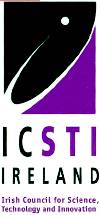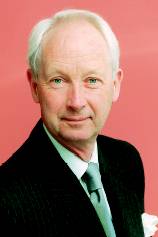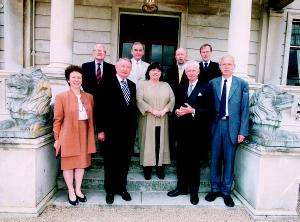| 2002 |

|
YEAR BOOK |
Forf�s � Irish Council for Science, Technology and Innovation
|
Report of the activities of the Irish Council for Science, Technology and Innovation in 2001/2002
|


The Council has twenty-five members and is chaired by Dr Edward M. Walsh, President Emeritus, University of Limerick.
The priority topics of the Council in the period 2001/2002 were:
Framework for an Overarching National Policy for Research and Technological Development
(Chair: Dr Edward M. Walsh, Chairman of ICSTI)
In a major new development, in March 2002, the Government requested the Council to bring forward proposals to develop an appropriate Framework for an Overarching National Policy for Research and Technological Development. It requested the Council to convene a high level Commission, to be chaired by Dr Edward Walsh, the ICSTI Chairman, to assist it in bringing forward these proposals.
The functions of the Commission include making recommendations for improving the structures and mechanisms for the formulation and implementation of National Research and Technological Development Policy � including co-ordination, synergy and linkages across the sectors and activities in the National Development Plan (2000�2006), and securing an appropriate funding balance.
At a special meeting on 9th April, 2002, the Council began its preparations to convene the Commission. On 14th June, Dr Edward M. Walsh announced its membership � which is composed of leading national and international experts.
The members of the Commission are:
��Dr Ruth Barrington, Chief Executive Officer, Health Research Board (nominee of the Department of Health and Children);
��Professor Sir John Cadogan, formerly first Director General of the Research Councils at the Office of Science and Technology, UK;
��Mr Martin Cronin, Chief Executive Officer, Forf�s;
��Professor Anthony Ledwith, Chairman, the UK Engineering and Physical Sciences Research Council (EPSRC) and, formerly, Director of Group Research, Pilkington Plc;
��Professor Dr Frieder Meyer-Krahmer, Director, Fraunhofer Institute for Systems and Innovation Research (ISI), Karlsruhe, Germany;
��Dr Heather Munroe-Blum, Vice-President, Research and International Relations, University of Toronto;
��Mr Esko-Olavi Seppala, Chief Planning Officer, Science and Technology Policy Council of Finland;
��Mr Brian N. Sweeney, Chairman, Siemens Ltd (Ireland);
��Dr Don Thornhill, Chairman, Higher Education Authority (nominee of the Department of Education and Science).

The Commission held its first meeting on 18th/19th June, when it considered the twenty-six submissions made to it by that date. It is scheduled to submit its proposals for consideration by the Government to the Minister for Enterprise, Trade and Employment by the end of this year.
Measuring and Evaluating Research
(Chair: Dr Pat Morgan, National University of Ireland, Galway)
The Council ratified a Statement entitled Measuring and Evaluating Research which will be published in autumn 2002. This Statement looks at the rationale for public funding of research, and the tools used to measure and assess the inputs and outputs from research.
To achieve this, it reviews the principal indicators and techniques used internationally to measure science, technology and innovation (STI) policy activities and their impacts. It provides an account of the current situation in Ireland with respect to STI indicators and their collection, as well as the application of STI evaluation tools.
The Statement recommends how current practice in Ireland could benefit from implementing best international practice.
The Statement acknowledges that the choice of indicators and evaluation techniques rests on underlying, sometimes implicit, models of the production of scientific knowledge. The main recommendations are that expertise in indicators and evaluation techniques for STI policy should be more widely embedded in public policy agencies in Ireland to more fully reflect the centrality of this domain of policy to economic and social development by:
��the continued development and use of such techniques by specialist agencies � e.g. Forf�s, the Higher Education Authority (HEA) and Science Foundation Ireland (SFI), and evaluation units involved in STI activities;
��the dissemination of information on, and the results of, such techniques in the wider policy community through publications and conferences/seminars on these themes;
��consultation with the scientific and technological communities as to the evaluation approaches adopted or under consideration;
��the much wider use by funding sources (typically government departments) of a formal, ex-ante evaluation prior to approving the introduction of any new or revised STI initiatives;
��the provision of a specific allocation for the costs of monitoring and evaluation within the overall budget for each STI support programme.
Following the Council Statement on Commercialisation of Research published in February 2001, new issues were raised in relation to intellectual property from publicly funded research, and linking third level research and industry.
In particular, the Council is exploring the benefits, or otherwise, of possible new guidelines, or legislation, for intellectual property management. The Council is also examining best practice in other countries. This work is scheduled for completion in Summer 2002.
Industrial Design and Development
(Chair: Mr Paul Holden, Redacteurs Software Documentation Ltd)
A project on initiatives to strengthen the implementation of strategic design practices in industry was completed. The work of the Task Force benchmarks product design and development practices in indigenous, non-food manufacturing firms and, in addition, identifies appropriate mechanisms to encourage firms to improve their strategic use of design.
Embedding the PharmaChem Industry in Ireland
(Chair: Dr Anita Maguire, National University of Ireland, Cork)
The Council is focussing on issues to further embed the PharmaChem industry in Ireland. This is part of a continuing process to follow up on the Technology Foresight recommendations to Government (April 1999). Skills, taxation, patents and regulation have been identified as key areas for consideration. Recommendations will be published in a Council Statement in late 2002.
Sustainable Development
(Chair: Professor Ted Farrell, National University of Ireland, Dublin)
The overall objective of Council work in the area of Sustainable Development is to identify constraints and opportunities and make recommendations to enable science and technology in Ireland to make a fuller contribution to sustainable growth. The approach being adopted is to draw out some general principles by means of case studies in selected sectors, including agriculture and forestry, clean production and renewable energy.
Presentation of the Organisation of Public Science, Technology and Innovation (STI) in Ireland
(Chair: Mr John Travers, Forf�s)
The scale and scope of funding for research and development in the context of the National Development Plan (NDP) means there is a variety of organisations involved in the funding and performance of public research. This project aims to clarify for researchers in the third level and industrial sectors the optimum route for them to follow to secure support for their specific research interests/activities.
It will develop an electronic portal-type site which will provide an overview of the public research system in Ireland. The site, whose structure and content has been agreed by the Council, will be hyper-linked to the funding programmes and mechanisms in each of the state agencies supporting research. The project is scheduled for completion in 2002.
Contact: The ICSTI Secretariat is provided by Forf�s, the national policy and advisory board for enterprise, trade, science, technology and innovation. Correspondence should be addressed to:
Ms Josephine Lynch,
The ICSTI Secretariat,
Wilton Park House, Wilton Place, Dublin 2;
Tel: +353 1 607 3186; E-mail: [email protected]